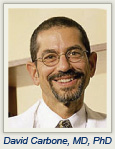
Commenting on the study, David Carbone, MD, PhD, of the Vanderbilt-Ingram Cancer Center, said that the Spanish group studied tumors from patients with completely resected stage I and II NSCLC for gene RNA expression profiles using 41,000 different probes. “Since over one-half of these patients relapse and die from their cancer in spite of complete resection, there is a pressing need for both defining those patients at the greatest risk of relapse for trials of adjuvant therapy, but also potentially avoiding the toxicity of adjuvant therapy in patients with a low risk of relapse,” Dr. Carbone said. “This is a potentially extremely important classifier, which if independently validated, could be the basis of such a test,” he said. Dr. Carbone noted that “It is interesting that the majority of the genes in the classifier are either immune-derived or immunomodulatory, suggesting a potential molecular basis for this observation.” ■
Disclosure: Dr. Carbone reported no potential conflict of interest.

